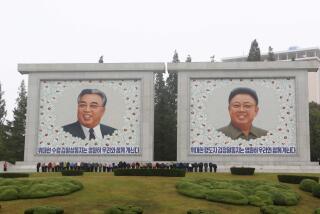Nitze Decries Soviet ‘Rhetoric’ at Geneva
- Share via
WASHINGTON — Despite agreement at the U.S.-Soviet summit in November to speed up arms talks, Ambassador Paul H. Nitze, the chief U.S. arms control adviser, reported Thursday that no progress was made in the most recent session because Moscow emphasized “public rhetoric” rather than concrete negotiating steps.
The United States has concluded, after detailed study, that the much-heralded proposal in January by Soviet leader Mikhail S. Gorbachev to eliminate nuclear weapons by the end of the century was “designed primarily for its political and propaganda impact” rather than to move the talks forward, he said.
“The Soviets have turned aside our efforts to expand areas of commonality” such as the stated goal of both sides to seek 50% cuts in offensive nuclear weapons, Nitze said at a State Department seminar. “As long as they (the Soviets) remain frozen in this approach, no significant progress is possible.”
Former Sen. John G. Tower, chief of the U.S. delegation to the long-range missile talks, said that Soviet delegates were unable to provide any additional information about Gorbachev’s public proposals, apparently demonstrating a lack of seriousness toward making progress at the bargaining table. He said no progress has been made in the strategic missile talks since President Reagan and Gorbachev met last November.
“I think they will continue to play the public diplomacy card,” Tower, who submitted his resignation this week, said at a press conference. “I’m disappointed that we didn’t make more progress. That doesn’t mean that I’ve lost hope.”
Some Progress Expected
Although there are no tangible reasons for optimism, a few U.S. officials and legislators believe that Gorbachev, with the 27th Soviet Communist Party Congress now behind him, may be preparing to give more attention to foreign affairs and arms issues and that some progress can be expected when negotiations resume in May.
Sen. Ted Stevens (R-Alaska), who has visited Geneva regularly as head of the congressional observation group on arms control, said recently that he sensed a greater degree of confidence in Soviet negotiators. “I don’t know why, but I feel more optimistic than last year” that progress will be made toward some agreement, he said.
Tower said that the Soviets may bargain seriously in the next round because Gorbachev “has economic objectives that I don’t think are entirely compatible with a military buildup, and this is likely to have an influence.”
“Some new elements” appeared in Gorbachev’s plan, Nitze conceded. In particular, the Soviets offered to conclude a U.S.-Soviet intermediate forces agreement separate from the British and French weapon systems for which they previously insisted on U.S. compensation.
But the offer was negated by “unacceptable conditions and omissions” that would kill British and French efforts to modernize their weapons, he said.
Times staff writer Norman Kempster contributed to this report.
More to Read
Sign up for Essential California
The most important California stories and recommendations in your inbox every morning.
You may occasionally receive promotional content from the Los Angeles Times.










